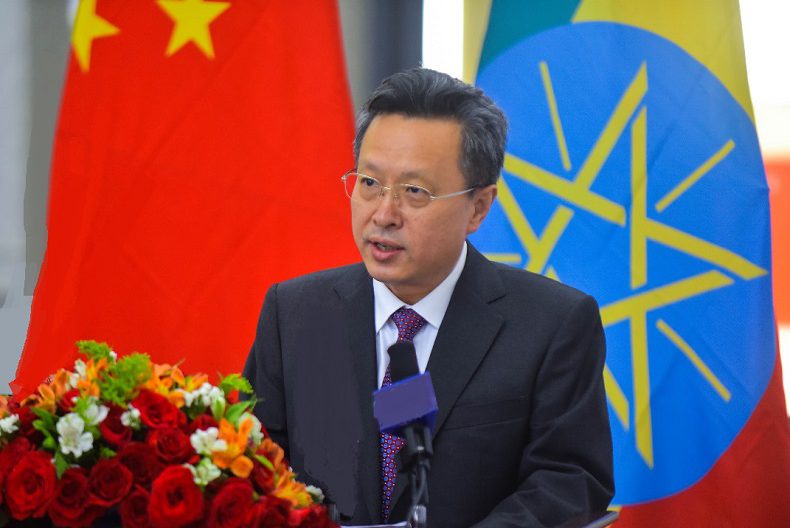
Ethiopia and China trace profound similarities in many topics. For instance one can easily mention the thousands of years of civilization and history, many cultural and religious practices, among others. To add spice on the stew, the two countries have consolidated their relations through the diplomatic relations they formed exactly 50 years ago. They have celebrated the diplomatic jubilee this year despite the surfacing of COVID 19.
Ever since the two sisterly nations cemented their relations through official diplomatic ties, they have been making significant and multilateral cooperation with clearly discernible outcome.
For these and so many reasons, The Ethiopian Herald would take the Ethiopian New Year holiday as an opportunity to invite Chinese Ambassador to Ethiopia, HE Mr. Zhao Zhiyuan, to briefly recapitulate the major milestones in the overall cooperation of the two countries. Have a nice read:
Ethiopia and China celebrated the 50th anniversary of their diplomatic ties in 2020, and forged a strong relationship over the past years. How would you describe the current state of Ethiopia-China relations?
China and Ethiopia are both ancient civilizations with rich history. The profound friendship was forged through the struggles for national independence and liberation. The two countries are partners and brothers. Since the establishment of diplomatic ties half a century ago, the relations between China and Ethiopia have been moving forward steadily and the traditional friendship has grown from strong to stronger. Since the inception of the Comprehensive Strategic Partnership in 2017, both countries have deepened political mutual trust and achieved fruitful results in cooperation across the board.
The two countries share similar philosophy on international relations and both uphold an independent foreign policy and oppose foreign intervention. With mutual understanding and support on major international affairs, the two sides have been working closely at global and regional levels.
Enhance coordination with each other. The two sides have always enjoyed mutual understanding and support on issues of respective core interests and major concerns, and have collaborated closely in international and regional affairs.
Mutually-beneficial cooperation is making steady progress and high-quality Belt and Road cooperation at full throttles, which plays a positive role in Ethiopia’s socio-economic recovery and development.
Stand in solidarity with each other. Following the outbreak of the pandemic, China and Ethiopia have stood closely together through thick and thin, and wrote a fine story of anti-pandemic cooperation, setting a shining example of China-Africa solidarity against COVID-19.
China has consolidated its position as Ethiopia’s largest source of investment and trading partner in recent years. What is your assessment of describe the practical cooperation between the two countries?
China has been Ethiopia’s biggest trading partner, No.1 source of FDI and the largest infrastructure contractor for consecutive years. China makes important contributions to Ethiopia’s industrialization and modernization drive as well as the development of sectors including infrastructure, manufacturing, energy and agriculture sectors. China-Ethiopia cooperation has scored remarkable achievement this year.
Cooperation in practical projects has been smooth-sailing. In the first seven months of 2021, the whole transport revenue of Ethio-Djibouti Railway had reached 46.903 million US Dollars, registering a 47per cent year-on-year increase. The African Leadership Excellence Academy and Addis Ababa River Side Green Development Project Phase I, which were built by Chinese assistance, have been completed and handed over successfully. These projects all won universal praise from the Ethiopian people.
Economic and trade cooperation is on gradual and steady recovery. According to the statistics from Chinese side, in the first half of this year, the bilateral trade volume arrived at $1.15 billion with China’s imports from Ethiopia at $215 million on a 9.8 per cent YoY growth, and the newly added non-financial outbound direct investment was $168 million on a 151.9 per cent YoY growth.
Health cooperation is growing with highlights. The coronavirus test kits plant established by a Chinese company is up and running. The company has also unveiled its first fast-testing laboratory in Africa at the Bole International Airport, which helps level up the local capability in virus detection and pandemic control, and keeps the China-Ethiopia air corridor unimpeded.
COVID-19 hit the world with unprecedented impacts. What is China’s contribution to the global response and to Ethiopia’s fight against the virus?
Since the pandemic broke out, under the strong leadership of the Central Committee of the Communist Party of China (CPC) with President Xi Jinping at its core, the Chinese government has put people and life front and center, taken the most comprehensive, rigorous and thorough anti-epidemic measures, become one of the first group of countries that put the virus under control. We have effectively safeguarded the Chinese people’s health and safety, won precious time for the international community to fight the virus. It demonstrates strong commitment to the Chinese people and the international community.
Acting on the vision of a global community of health for all, China reported information on the virus at the earliest possible time, shared the genome sequence and its containment and treatment experience with the international community in a timely manner.
China has launched the most intensive and extensive emergency humanitarian assistance to international partners since the founding of the New China, and taken the lead in conducting the largest scale global vaccine cooperation, which makes an outstanding contribution to global public health security. Till now, we have provided 2 billion US dollars in assistance for the COVID-19 response and economic and social recovery in developing countries hit by the pandemic, sent medical supplies to more than 150 countries and 13 international organizations, and have been or is donating vaccines to more than 105 countries and 4 international organizations, and have exported vaccines to more than 60 countries, with a total exceeding 990 million doses.
China and Ethiopia have made remarkable progress in solidarity against COVID-19. The Chinese government at the central and local levels, enterprises and commerce chambers as well as organizations from different sectors have delivered a large number of needed medical supplies to Ethiopia among other forms of tangible support. Ethiopia was the destination for the very first Chinese medical expert team to Africa. Despite its capacity restraints and huge demand at home, China became the first country to make continued vaccine donations to Ethiopia through inter-government bilateral channels, in an active effort to honor President Xi’s pledge of making African countries the first beneficiaries of Chinese vaccines. And till now, the number of vaccine doses China donated has reached 1 million.
Talking about the COVID-19 origin-tracing, so would you elaborate on the role China has played in global origin-tracing?
On China’s fight against COVID-19, the White Paper issued by the Chinese government had explicitly laid out the timeline of China’s response. This will help with the origins tracing work and lead to a more united and effective global response to similar public health crises in the future.
Since the beginning of the epidemic, China has taken a scientific, professional, serious and responsible attitude in tracing the origins of the virus. China takes the lead in working with the WHO in global origins tracing. Since last year, we have invited WHO experts to China twice to carry out origins study. On March 30, the WHO officially released the report of the WHO-convened global study of origins.
of SARS-CoV-2 China Part. China’s open and transparent attitude on tracing the origins of the virus has also been fully recognized by international experts. The formulation of this report follows WHO procedures and adopts a scientific approach. It is authoritative and science-based and has been widely recognized and respected by the international community. It has laid a sound foundation for advancing global origins tracing.
Would you mind give a detailed account of the origin-tracing work by the WHO international team in China?
The study of origins is a serious matter of science. It is important to uphold the spirit of openness, transparency, science, and cooperation. There should be no artificially created blind spot in origins tracing work, still less malicious false accusations and presumption of guilt for political purposes. This is a widely shared consensus of the international community. China firmly opposes these moves.
China has always participated in international origin-tracing cooperation. Earlier this year, leading experts from 10 countries including the US, UK, Japan and Australia formed a joint expert group with their Chinese counterparts. They conducted a 28-day joint study in China, during which they jointly analyzed data, conducted field trips, paid visits and had exchange of views to keep building science-based consensus. With concerted efforts and scientific assessment, the WHO officially released the joint WHO-China study report. The report points out the virus is “extremely unlikely” to be introduced through a laboratory incident, “most likely” to be introduced through an intermediary host species, and “likely” to be introduced through direct transmission or cold-chain food. This joint report should serve as the basis for the second phase of studies.
I’d like to reaffirm that China always supports the tracing of origin in a scientific manner. What China firmly disagrees with is the highly politicized origin-tracing. China appeals the next-phase origins study should be guided by the WHA resolution, rely mainly on scientists, and conduct evidence-based scientific research. The practice, mechanisms and approaches used in the first phase should be drawn on to conduct further studies. And in light of the time lines and key links that have been revealed of the outbreaks in multiple countries, efforts should be made to advance origins study in various countries and regions across the world. China will continue to participate in science-based origins study, actively implement the recommendations of the first-phase joint mission report, and conduct follow-up complementary studies.
How do you envision Ethiopia-China relations and cooperation in future, especially in the post-pandemic era? What do you think about space science cooperation, where would be this cooperation in the next five to ten years?
Both countries are facing the historic mission of bettering people’s lives and accelerating growth. China is ready to work with Ethiopia to strengthen the Comprehensive Strategic Cooperative Partnership that continues to serve as a pacesetter of China-Africa relations, and elevate it to an even higher state of All-weather Strategic Partnership.
China is ready to work with Ethiopia to upgrade bilateral cooperation with more elements and in broader areas. The bilateral cooperation has a huge potential in areas such as green development, digital economy, tourism and aerospace. As Prime Minister Abiy said, “Space is the limit”, China-Ethiopia relations enjoy broad prospects and infinite possibilities.
Through the test of COVID-19, China-Ethiopia friendship has been further elevated. We will deliver on the outcomes of the Extraordinary China-Africa Summit on Solidarity against COVID-19 by continuing support within its capacity to Ethiopia’s efforts to defeat the virus. We are more than ready to play a conducive role as Ethiopia undertakes to boost the economy and improve people’s lives. To this end, we will join hands with Ethiopia to further synergize development plans of the two sides, deepen practical cooperation in economy, health and other areas, and promote high-quality development of Belt and Road projects. China will join hands with Ethiopia in its national industrialization and modernization drive, to elevate the Comprehensive Strategic Cooperative Partnership to a higher level, and toward an even stronger China-Africa community with a shared future.
A new session of the Forum on China-Africa Cooperation (FOCAC) will be held soon, we are also looking forward to this. How do you envision China-Africa practical cooperation and which sector could be the next highlight in the new era?
A new session of FOCAC is coming soon, twenty years on, FOCAC makes itself the key driving force for the time-honored China-Africa friendship. FOCAC has bolstered high-level interactions and political trust between China and Africa, and practical cooperation between the two sides has been fruitful. According to African friends, FOCAC is a cooperation mechanism that truly delivers, has deepened political mutual trust and achieved fruitful results in cooperation.
China and Africa are highly complementary in development strengths. In recent years, the two sides jointly drafted and implemented “Ten Cooperation Plans” and “Eight Major Initiatives”, within the premises of FOCAC, taking practical cooperation to a new level. According to the Report on Chinese Investment in Africa which was launched lately, over the past 20 years, the flow of China’s direct investment in Africa has been growing by more than 25 percent on a yearly average. Despite the impact of COVID-19, China’s investment in Africa has increased from $2.71 billion in 2019 to $2.96 billion in 2020, which shows China’s investment in Africa is steady and strong. And the investment also makes remarkable contribution to social stability and economic prosperity in African countries.
At the same time, I’d like to share with you, China regards digital innovation as an emerging sector for practical cooperation between China and Africa, and devotes to helping Africa seize the opportunity presented by the information revolution, bridging the digital divide and building a digital Africa. On August 24, China announced that it will work together with African countries to formulate and implement a plan for China-Africa digital innovation partnership, and proposed efforts in six aspects. First, strengthen digital infrastructure to ensure unimpeded information flow for socioeconomic development. Second, nurture the digital economy and promote the integrated development of the digital technology and the real economy. Third, advance digital education to produce a talent pool for digital innovation and thus remove the bottleneck. Fourth, enhance digital inclusiveness to make sure services benefit all African people. Fifth, jointly ensure digital security and improve digital governance capability. Sixth, build cooperation platforms to stimulate progress with exchange. I believe, the plan will bring China-Africa digital cooperation to a new height, and inject new impetus into high quality China-Africa cooperation.
Finally, I’d like to emphasize, China and Africa are good friends, partners and brothers, and more importantly, an important force for world peace and development. The more complex and fluid the international landscape is, the greater the imperative for China and Africa to adhere to the fundamental direction of building a China-Africa community with a shared future. China is ready to stay united and work more closely together with African countries, including Ethiopia, and take the opportunity of the new session of the FOCAC to break new ground for cooperation, and deliver new benefits to the people. Let’s make FOCAC a greater success and further deepen China-Africa relations, so as to further enhance our friendship and justice in the world.
Let me take this opportunity to extend festive greetings on the Ethiopian New Year. May Ethiopia enjoy lasting peace and prosperity, its people happiness and tranquility!
Thank you very much!
My pleasure!
BY STAFF REPORTER
The Ethiopian Herald 11 September 2021





